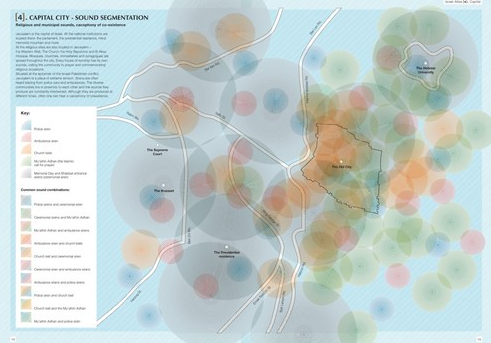[I’m cross-posting this from the Digital Summer Institute’s blog at Oxy. This post is meant to ignite some conversations on alternative argumentation from the perspective of sound.]
To forward the theme of digital and media fluency for this year’s DSI, I’d like to start a conversation about the role of audio and sound in multimedia scholarship. There are, of course, obvious applications of sound in fields such as musicology and media studies. But I would like to broaden the engagement with sound to non-music-specific disciplines. There are a few ways to think about this. I will outlinen these approaches in the following:
1. Soundscape: In ethnographic scholarship, there is an emerging practice of sound-specific fieldwork. Some of this scholarship is based on the work of Pierre Schaeffer, a composer and philosopher who coined the term “musique concrete” to radically consider environmental sounds as being musical. In the case of field research, anthropologists have considered the observations of sound as a cultural practice. This could be useful for the urban studies. For instance, what is the soundscape of a working-class neighborhood that is bounded by highways and factories? Carey has written a fantastic post about her “sonification of social life” assignment. In terms of research, a couple of examples of a soundscape-based multimedia ethnography include the Unspeakable Things series hosted by Sensate Journal; a map of sound segmentation of Jerusalem. There’s also a group out of the anthropology department at UC Irvine that is interested in sound-specific inquiries.

2. Sonic representation of culture: Sound can be a medium to represent culture and knowledge. Some humanistic scholars and journalists have begun to convey their works in the form of a podcast, radio documentary, oral history, and digital storytelling. Here, we can begin to explore about the role of sound in structuring writing and composition assignments for students; and to make space for students to develop critical listening skills for analyzing audio-based scholarly content. An example of scholarly podcasts is the Pop Conference podcast series hosted on the Experience Music Project iTunesU.
New addition: Also check out Jentery Sayers’ syllabus for “Sonic Culture and Media Activism” for exemplary analysis and making assignments On sound as culture.
3. Sonification of non-sound-specific texts: An emerging group of non-music researchers have looked at their objects of study by bringing works into the sonic domain. This approach can be particularly useful for the study of poetry, theater, and (foreign) language. A compelling example of this kind of research is Tanya Clement’s use of sound tools to explore patterns of sound in Gertrude Stein’s poetry.
On the side of teaching, both Suzanne and I integrated audio assignments into our CSP courses last fall. Suzanne did a fan autoethnography assignment. In my CSP course on Race and Gender in Popular Music, the first assignment is a musical autobiography. I asked my students to not only locate their own personal connections to music but to also embody their voice in a sonic form. A rather radical approach to bring writing into sonic and vocal register, I asked my students to record their own autobiography, using Audacity, in their own voice. This assignment is inspired by Eve Sedgwick’s “Experimental Critical Writing” course syllabus.
The reason for constructing this assignment is that I often see students attempting to sound “scholarly” in writing. The purpose of this exercise was to disabuse them of their notions of having to sound scholarly. Instead of sounding like a generic scholar, whatever that is in their heads, I wanted them to take control, to reclaim their own voice, and to embody argumentative writing on their own terms. I asked them to record their own autobiography in their own voice. I also asked them to integrate meaningful sounds into their recording. After they posted their sonic autobiography, I asked them to do a critical listening exercise: What do your voice sound like? Do you have a confident voice? Timid? Anxious? Casual? Informal? Cogent? Introspective?
Here’s an example of a student’s musical autobiography as shared on SoundCloud (a sound-based community where users post, share, and comment on audio works). In this example, the student integrated sounds that represent her early experiences of music.


 bio
bio
6 Comments
Pingback: Wendy Hsu | beingwendyhsu.info » Toward a sound-based scholarship
Pingback: Autoethnography « A Book of Healing: Practicing a Psychotherapy of Liberation with African-Americans